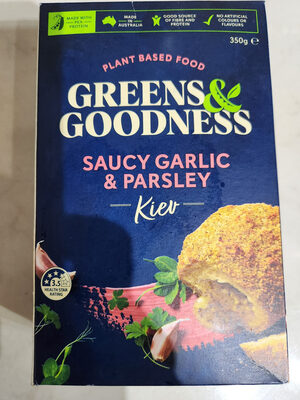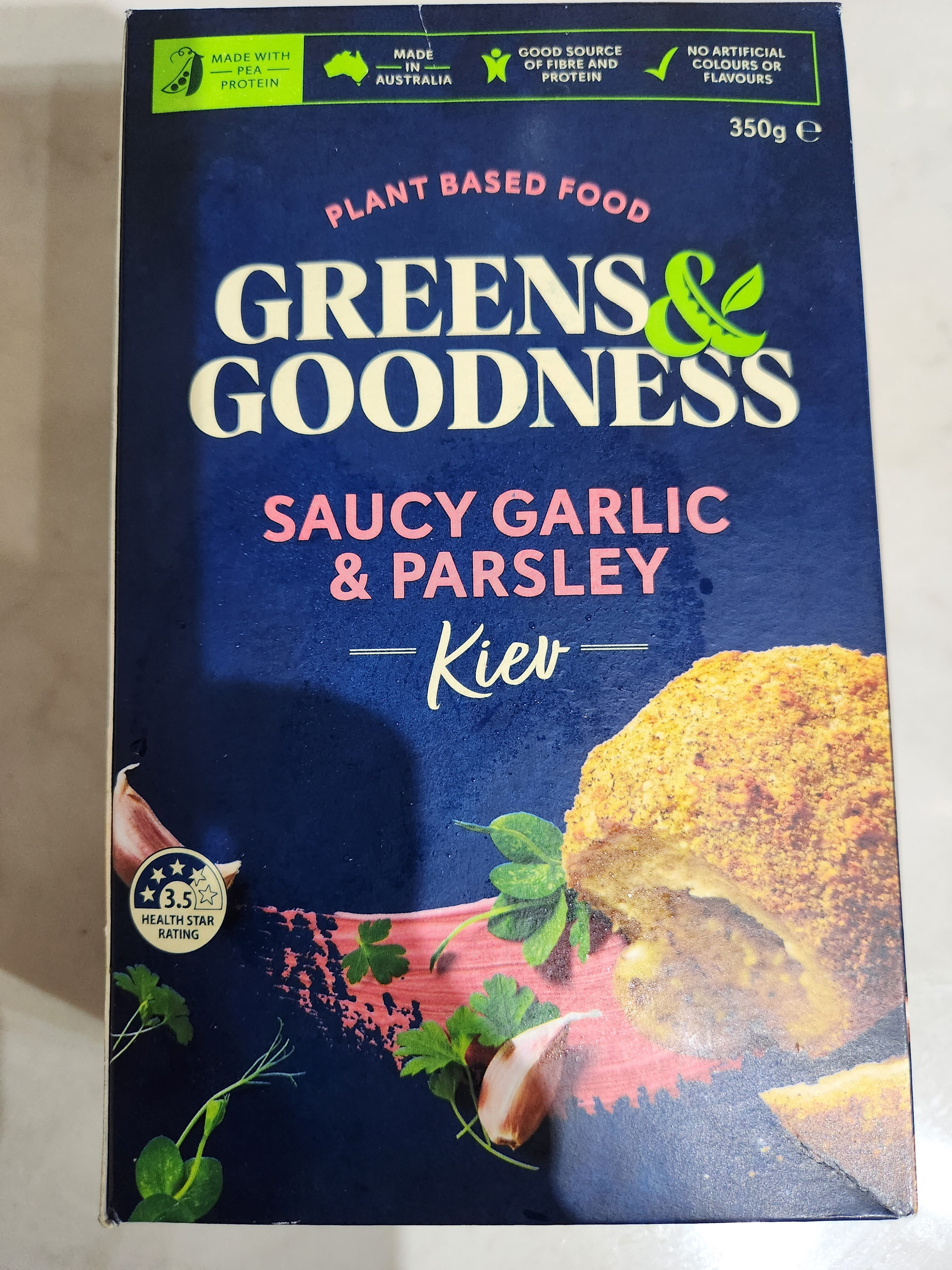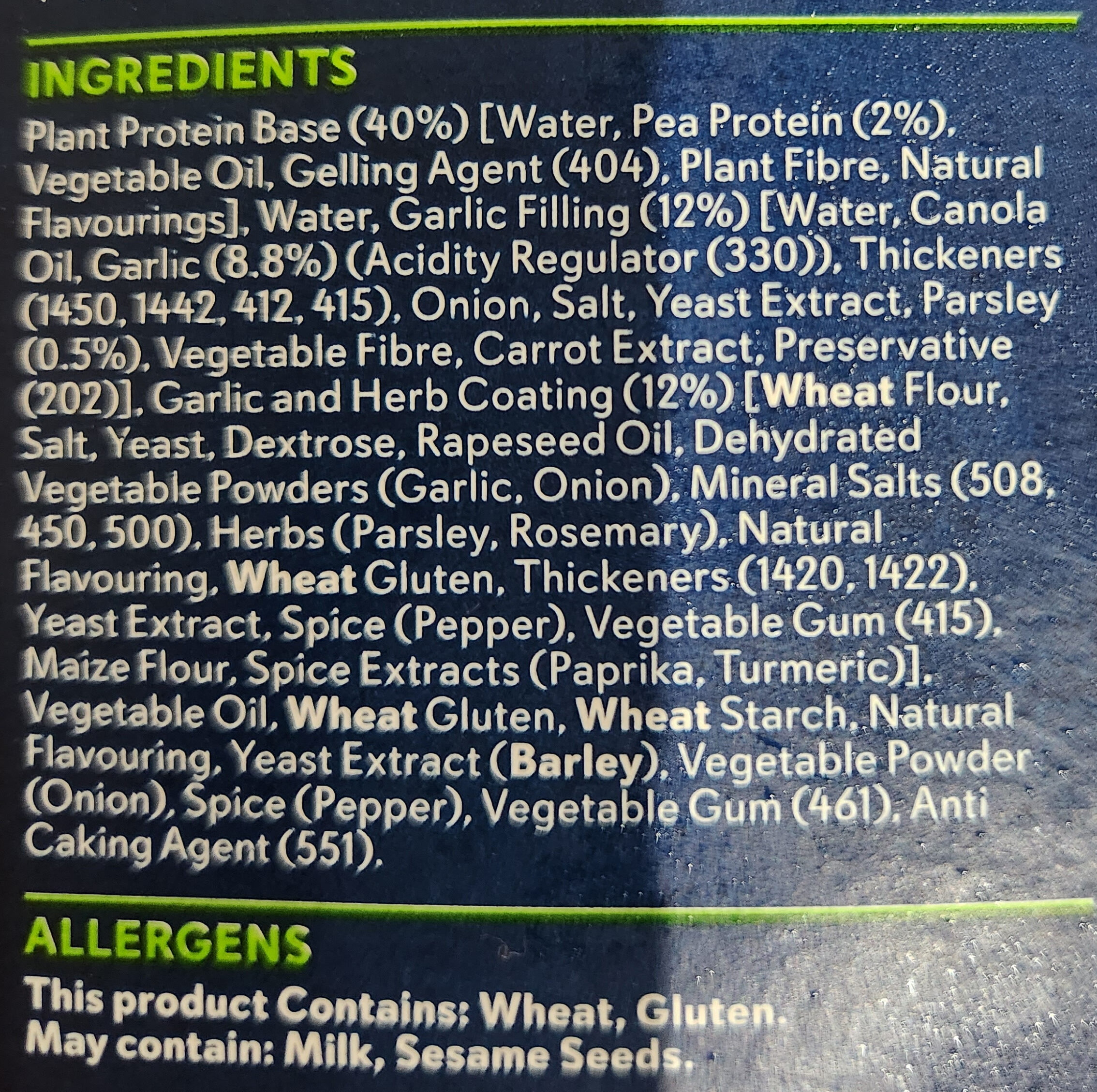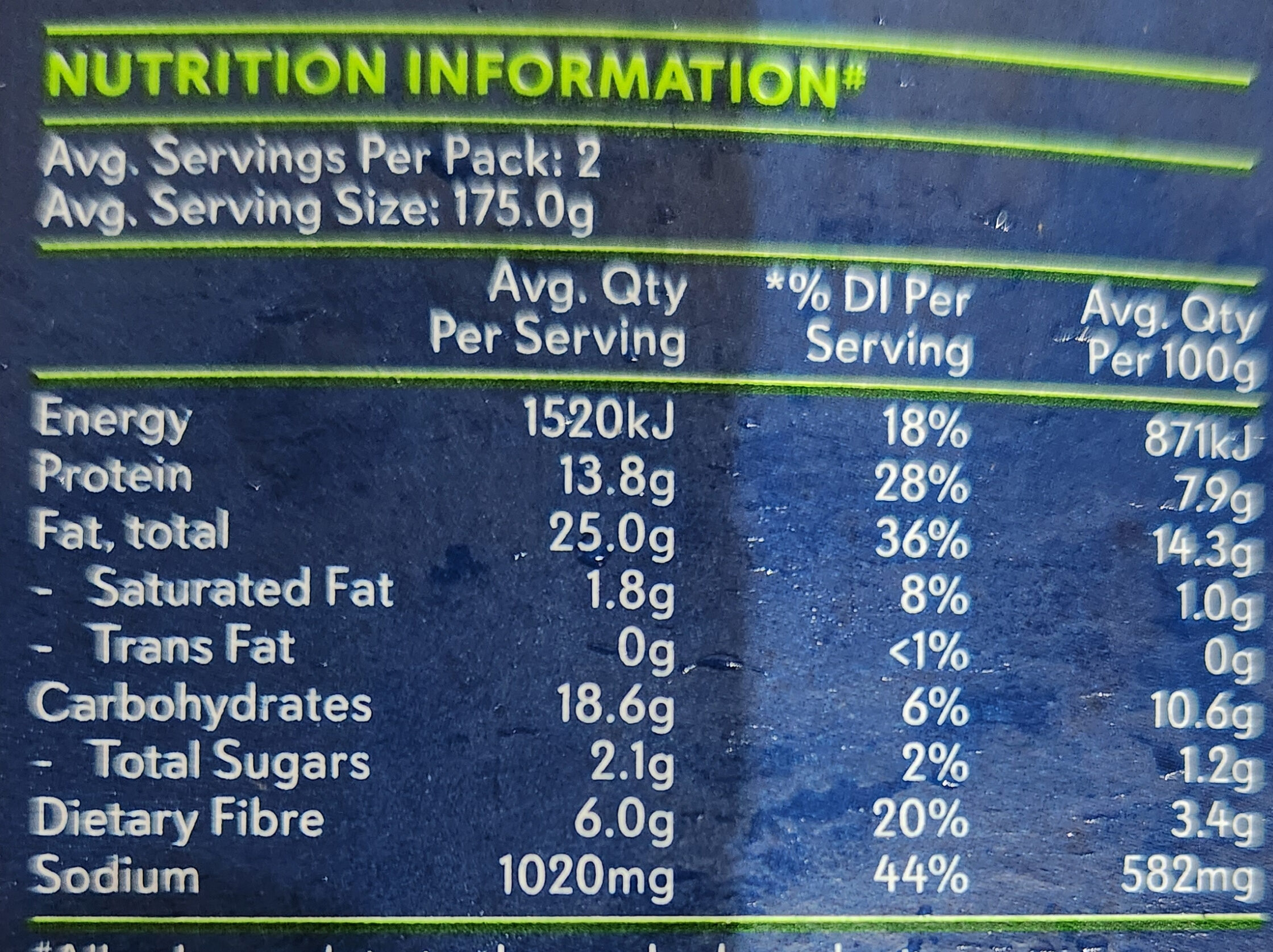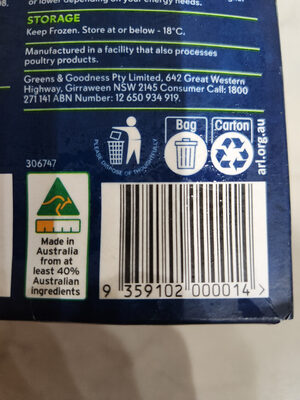Help us make food transparency the norm!
As a non-profit organization, we depend on your donations to continue informing consumers around the world about what they eat.
The food revolution starts with you!
saucy garlic and parsley kiev - Greens & Goodness - 2 kievs, 350g total
saucy garlic and parsley kiev - Greens & Goodness - 2 kievs, 350g total
This product page is not complete. You can help to complete it by editing it and adding more data from the photos we have, or by taking more photos using the app for Android or iPhone/iPad. Thank you!
×
Barcode: 9359102000014 (EAN / EAN-13)
Quantity: 2 kievs, 350g total
Brands: Greens & Goodness
Categories: Meat alternatives, Meat analogues, Breaded products, Chicken kievs substitutes
Labels, certifications, awards:
Australian made, Health Star Rating, Health Star Rating 3.5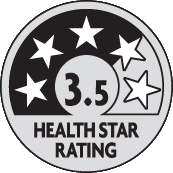
Countries where sold: Australia
Matching with your preferences
Health
Ingredients
-
73 ingredients
Plant Protein Base (40%) [Water, Pea Protein (2%), Vegetable Oil, Gelling Agent (404), Plant Fibre, Natural Flavourings], Water, Garlic Filling (12%) [Water, Canola Oil, Garlic (8.8%) (Acidity Regulator (330)), Thickeners (1450, 1442, 412, 415), Onion, Salt, Yeast Extract, Parsley (0.5%), Vegetable Fibre, Carrot Extract, Preservative (202)], Garlic and Herb Coating (12%) [Wheat Flour, Salt, Yeast, Dextrose, Rapeseed Oil, Dehydrated Vegetable Powders (Garlic, Onion), Mineral Salts (508, 450, 500), Herbs (Parsley, Rosemary), Natural Flavouring, Wheat Gluten, Thickeners (1420, 1422), Yeast Extract, Spice (Pepper), Vegetable Gum (415), Maize Flour, Spice Extracts (Paprika, Turmeric)], Vegetable Oil, Wheat Gluten, Wheat Starch, Natural Flavouring, Yeast Extract (Barley), Vegetable Powder (Onion), Spice (Pepper), Vegetable Gum (461). Anti Caking Agent (551) This product Contains: Wheat, Gluten. May contain: Milk, Sesame Seeds.Allergens: GlutenTraces: Milk, Sesame seeds
Food processing
-
Ultra processed foods
Elements that indicate the product is in the 4 - Ultra processed food and drink products group:
- Additive: E1420 - Acetylated starch
- Additive: E1422 - Acetylated distarch adipate
- Additive: E1442 - Hydroxypropyl distarch phosphate
- Additive: E1450 - Starch sodium octenyl succinate
- Additive: E404 - Calcium alginate
- Additive: E412 - Guar gum
- Additive: E415 - Xanthan gum
- Additive: E450 - Diphosphates
- Additive: E461 - Methyl cellulose
- Ingredient: Dextrose
- Ingredient: Flavouring
- Ingredient: Gelling agent
- Ingredient: Glucose
- Ingredient: Gluten
- Ingredient: Thickener
Food products are classified into 4 groups according to their degree of processing:
- Unprocessed or minimally processed foods
- Processed culinary ingredients
- Processed foods
- Ultra processed foods
The determination of the group is based on the category of the product and on the ingredients it contains.
Additives
-
E1422 - Acetylated distarch adipate
Acetylated distarch adipate: Acetylated distarch adipate -E1422-, is a starch that is treated with acetic anhydride and adipic acid anhydride to resist high temperatures. It is used in foods as a bulking agent, stabilizer and a thickener. No acceptable daily intake for human consumption has been determined.Source: Wikipedia
-
E1442 - Hydroxypropyl distarch phosphate
Hydroxypropyl distarch phosphate: Hydroxypropyl distarch phosphate -HDP- is a modified resistant starch. It is currently used as a food additive -INS number 1442-. It is approved for use in the European Union -listed as E1442-, the United States, Australia, Taiwan, and New Zealand.Source: Wikipedia
-
E202 - Potassium sorbate
Potassium sorbate (E202) is a synthetic food preservative commonly used to extend the shelf life of various food products.
It works by inhibiting the growth of molds, yeast, and some bacteria, preventing spoilage. When added to foods, it helps maintain their freshness and quality.
Some studies have shown that when combined with nitrites, potassium sorbate have genotoxic activity in vitro. However, potassium sorbate is generally recognized as safe (GRAS) by regulatory authorities.
-
E330 - Citric acid
Citric acid is a natural organic acid found in citrus fruits such as lemons, oranges, and limes.
It is widely used in the food industry as a flavor enhancer, acidulant, and preservative due to its tart and refreshing taste.
Citric acid is safe for consumption when used in moderation and is considered a generally recognized as safe (GRAS) food additive by regulatory agencies worldwide.
-
E404 - Calcium alginate
Calcium alginate: Calcium alginate is a water-insoluble, gelatinous, cream-coloured substance that can be created through the addition of aqueous calcium chloride to aqueous sodium alginate. Calcium alginate is also used for entrapment of enzymes and forming artificial seeds in plant tissue culture. "Alginate" is usually the salts of alginic acid, but it can also refer to derivatives of alginic acid and alginic acid itself; in some publications the term "algin" is used instead of alginate. Alginate is present in the cell walls of brown algae, as the calcium, magnesium and sodium salts of alginic acid.Source: Wikipedia
-
E412 - Guar gum
Guar gum (E412) is a natural food additive derived from guar beans.
This white, odorless powder is valued for its remarkable thickening and stabilizing properties, making it a common ingredient in various food products, including sauces, dressings, and ice creams.
When used in moderation, guar gum is considered safe for consumption, with no known adverse health effects.
-
E415 - Xanthan gum
Xanthan gum (E415) is a natural polysaccharide derived from fermented sugars, often used in the food industry as a thickening and stabilizing agent.
This versatile food additive enhances texture and prevents ingredient separation in a wide range of products, including salad dressings, sauces, and gluten-free baked goods.
It is considered safe for consumption even at high intake amounts.
-
E450 - Diphosphates
Diphosphates (E450) are food additives often utilized to modify the texture of products, acting as leavening agents in baking and preventing the coagulation of canned food.
These salts can stabilize whipped cream and are also found in powdered products to maintain their flow properties. They are commonly present in baked goods, processed meats, and soft drinks.
Derived from phosphoric acid, they're part of our daily phosphate intake, which often surpasses recommended levels due to the prevalence of phosphates in processed foods and drinks.
Excessive phosphate consumption is linked to health issues, such as impaired kidney function and weakened bone health. Though diphosphates are generally regarded as safe when consumed within established acceptable daily intakes, it's imperative to monitor overall phosphate consumption to maintain optimal health.
-
E461 - Methyl cellulose
Methyl cellulose: Methyl cellulose -or methylcellulose- is a chemical compound derived from cellulose. It is a hydrophilic white powder in pure form and dissolves in cold -but not in hot- water, forming a clear viscous solution or gel. It is sold under a variety of trade names and is used as a thickener and emulsifier in various food and cosmetic products, and also as a treatment of constipation. Like cellulose, it is not digestible, not toxic, and not an allergen.Source: Wikipedia
-
E500 - Sodium carbonates
Sodium carbonates (E500) are compounds commonly used in food preparation as leavening agents, helping baked goods rise by releasing carbon dioxide when they interact with acids.
Often found in baking soda, they regulate the pH of food, preventing it from becoming too acidic or too alkaline. In the culinary world, sodium carbonates can also enhance the texture and structure of foods, such as noodles, by modifying the gluten network.
Generally recognized as safe, sodium carbonates are non-toxic when consumed in typical amounts found in food.
-
E508 - Potassium chloride
Potassium chloride: Potassium chloride -KCl- is a metal halide salt composed of potassium and chlorine. It is odorless and has a white or colorless vitreous crystal appearance. The solid dissolves readily in water and its solutions have a salt-like taste. KCl is used as a fertilizer, in medicine, in scientific applications, and in food processing. In a few states of the United States it is used to cause cardiac arrest as the third drug in the "three drug cocktail" for executions by lethal injection. It occurs naturally as the mineral sylvite, and in combination with sodium chloride as sylvinite.The version for injection is on the World Health Organization's List of Essential Medicines, the most important medications needed in a basic health system.Source: Wikipedia
Ingredients analysis
-
May contain palm oil
Ingredients that may contain palm oil: Vegetable oil, Vegetable oil
-
Vegan status unknown
Unrecognized ingredients: Plant-protein-base, 404, Garlic-filling, 330, 1450, 1442, 412, 415, 202, Garlic-and-herb-coating, Dehydrated-vegetable-powders, Mineral-salts, 508, 450, 500, 1420, 1422, Vegetable-gum, 415, Vegetable-gum, 461, 551, This-productSome ingredients could not be recognized.
We need your help!
You can help us recognize more ingredients and better analyze the list of ingredients for this product and others:
- Edit this product page to correct spelling mistakes in the ingredients list, and/or to remove ingredients in other languages and sentences that are not related to the ingredients.
- Add new entries, synonyms or translations to our multilingual lists of ingredients, ingredient processing methods, and labels.
If you would like to help, join the #ingredients channel on our Slack discussion space and/or learn about ingredients analysis on our wiki. Thank you!
-
Vegetarian status unknown
Unrecognized ingredients: Plant-protein-base, 404, Garlic-filling, 330, 1450, 1442, 412, 415, 202, Garlic-and-herb-coating, Dehydrated-vegetable-powders, Mineral-salts, 508, 450, 500, 1420, 1422, Vegetable-gum, 415, Vegetable-gum, 461, 551, This-productSome ingredients could not be recognized.
We need your help!
You can help us recognize more ingredients and better analyze the list of ingredients for this product and others:
- Edit this product page to correct spelling mistakes in the ingredients list, and/or to remove ingredients in other languages and sentences that are not related to the ingredients.
- Add new entries, synonyms or translations to our multilingual lists of ingredients, ingredient processing methods, and labels.
If you would like to help, join the #ingredients channel on our Slack discussion space and/or learn about ingredients analysis on our wiki. Thank you!
-
Details of the analysis of the ingredients
We need your help!
Some ingredients could not be recognized.
We need your help!
You can help us recognize more ingredients and better analyze the list of ingredients for this product and others:
- Edit this product page to correct spelling mistakes in the ingredients list, and/or to remove ingredients in other languages and sentences that are not related to the ingredients.
- Add new entries, synonyms or translations to our multilingual lists of ingredients, ingredient processing methods, and labels.
If you would like to help, join the #ingredients channel on our Slack discussion space and/or learn about ingredients analysis on our wiki. Thank you!
: Plant Protein Base 40% (Water, Pea Protein 2%, Vegetable Oil, Gelling Agent (404), Plant Fibre, Natural Flavourings), Water, Garlic Filling 12% (Water, Canola Oil, Garlic 8.8% (Acidity Regulator (330)), Thickeners (1450, 1442, 412, 415), Onion, Salt, Yeast Extract, Parsley 0.5%, Vegetable Fibre, Carrot Extract, Preservative (202)), Garlic and Herb Coating 12% (Wheat Flour, Salt, Yeast, Dextrose, Rapeseed Oil, Dehydrated Vegetable Powders (Garlic, Onion), Mineral Salts (508, 450, 500), Herbs (Parsley, Rosemary), Natural Flavouring, Wheat Gluten, Thickeners (1420, 1422), Yeast Extract, Spice (Pepper), Vegetable Gum (415), Maize Flour, Spice Extracts (Paprika, Turmeric)), Vegetable Oil, Wheat Gluten, Wheat Starch, Natural Flavouring, Yeast Extract (Barley), Vegetable (Onion), Spice (Pepper), Vegetable Gum (461), Anti Caking Agent (551), This product- Plant Protein Base -> en:plant-protein-base - percent: 40
- Water -> en:water - vegan: yes - vegetarian: yes - ciqual_food_code: 18066
- Pea Protein -> en:pea-protein - vegan: yes - vegetarian: yes - percent: 2
- Vegetable Oil -> en:vegetable-oil - vegan: yes - vegetarian: yes - from_palm_oil: maybe
- Gelling Agent -> en:gelling-agent
- 404 -> en:404
- Plant Fibre -> en:vegetable-fiber - vegan: yes - vegetarian: yes
- Natural Flavourings -> en:natural-flavouring - vegan: maybe - vegetarian: maybe
- Water -> en:water - vegan: yes - vegetarian: yes - ciqual_food_code: 18066
- Garlic Filling -> en:garlic-filling - percent: 12
- Water -> en:water - vegan: yes - vegetarian: yes - ciqual_food_code: 18066
- Canola Oil -> en:canola-oil - vegan: yes - vegetarian: yes - from_palm_oil: no
- Garlic -> en:garlic - vegan: yes - vegetarian: yes - ciqual_food_code: 11000 - percent: 8.8
- Acidity Regulator -> en:acidity-regulator
- 330 -> en:330
- Acidity Regulator -> en:acidity-regulator
- Thickeners -> en:thickener
- 1450 -> en:1450
- 1442 -> en:1442
- 412 -> en:412
- 415 -> en:415
- Onion -> en:onion - vegan: yes - vegetarian: yes - ciqual_food_code: 20034
- Salt -> en:salt - vegan: yes - vegetarian: yes - ciqual_food_code: 11058
- Yeast Extract -> en:yeast-extract - vegan: yes - vegetarian: yes
- Parsley -> en:parsley - vegan: yes - vegetarian: yes - ciqual_proxy_food_code: 11014 - percent: 0.5
- Vegetable Fibre -> en:vegetable-fiber - vegan: yes - vegetarian: yes
- Carrot Extract -> en:carrot-extract - vegan: yes - vegetarian: yes - ciqual_food_code: 20009
- Preservative -> en:preservative
- 202 -> en:202
- Garlic and Herb Coating -> en:garlic-and-herb-coating - percent: 12
- Wheat Flour -> en:wheat-flour - vegan: yes - vegetarian: yes - ciqual_proxy_food_code: 9410
- Salt -> en:salt - vegan: yes - vegetarian: yes - ciqual_food_code: 11058
- Yeast -> en:yeast - vegan: yes - vegetarian: yes
- Dextrose -> en:dextrose - vegan: yes - vegetarian: yes - ciqual_proxy_food_code: 31016
- Rapeseed Oil -> en:rapeseed-oil - vegan: yes - vegetarian: yes - from_palm_oil: no
- Dehydrated Vegetable Powders -> en:dehydrated-vegetable-powders
- Garlic -> en:garlic - vegan: yes - vegetarian: yes - ciqual_food_code: 11000
- Onion -> en:onion - vegan: yes - vegetarian: yes - ciqual_food_code: 20034
- Mineral Salts -> en:mineral-salts
- 508 -> en:508
- 450 -> en:450
- 500 -> en:500
- Herbs -> en:herb - vegan: yes - vegetarian: yes
- Parsley -> en:parsley - vegan: yes - vegetarian: yes - ciqual_proxy_food_code: 11014
- Rosemary -> en:rosemary - vegan: yes - vegetarian: yes
- Natural Flavouring -> en:natural-flavouring - vegan: maybe - vegetarian: maybe
- Wheat Gluten -> en:wheat-gluten - vegan: yes - vegetarian: yes
- Thickeners -> en:thickener
- 1420 -> en:1420
- 1422 -> en:1422
- Yeast Extract -> en:yeast-extract - vegan: yes - vegetarian: yes
- Spice -> en:spice - vegan: yes - vegetarian: yes
- Pepper -> en:pepper - vegan: yes - vegetarian: yes
- Vegetable Gum -> en:vegetable-gum
- 415 -> en:415
- Maize Flour -> en:corn-flour - vegan: yes - vegetarian: yes - ciqual_food_code: 9545
- Spice Extracts -> en:spice-extract - vegan: yes - vegetarian: yes
- Paprika -> en:paprika - vegan: yes - vegetarian: yes - ciqual_food_code: 11049
- Turmeric -> en:turmeric - vegan: yes - vegetarian: yes - ciqual_proxy_food_code: 11089
- Vegetable Oil -> en:vegetable-oil - vegan: yes - vegetarian: yes - from_palm_oil: maybe
- Wheat Gluten -> en:wheat-gluten - vegan: yes - vegetarian: yes
- Wheat Starch -> en:wheat-starch - vegan: yes - vegetarian: yes - ciqual_proxy_food_code: 9510
- Natural Flavouring -> en:natural-flavouring - vegan: maybe - vegetarian: maybe
- Yeast Extract -> en:yeast-extract - vegan: yes - vegetarian: yes
- Barley -> en:barley - vegan: yes - vegetarian: yes
- Vegetable -> en:vegetable - vegan: yes - vegetarian: yes
- Onion -> en:onion - vegan: yes - vegetarian: yes - ciqual_food_code: 20034
- Spice -> en:spice - vegan: yes - vegetarian: yes
- Pepper -> en:pepper - vegan: yes - vegetarian: yes
- Vegetable Gum -> en:vegetable-gum
- 461 -> en:461
- Anti Caking Agent -> en:anti-caking-agent
- 551 -> en:551
- This product -> en:this-product
Nutrition
-
Good nutritional quality
⚠ ️Warning: the amount of fruits, vegetables and nuts is not specified on the label, it was estimated from the list of ingredients: 12This product is not considered a beverage for the calculation of the Nutri-Score.
Positive points: 7
- Proteins: 4 / 5 (value: 7.9, rounded value: 7.9)
- Fiber: 3 / 5 (value: 3.4, rounded value: 3.4)
- Fruits, vegetables, nuts, and colza/walnut/olive oils: 0 / 5 (value: 12.9796875, rounded value: 13)
Negative points: 8
- Energy: 2 / 10 (value: 871, rounded value: 871)
- Sugars: 0 / 10 (value: 1.2, rounded value: 1.2)
- Saturated fat: 0 / 10 (value: 1, rounded value: 1)
- Sodium: 6 / 10 (value: 582, rounded value: 582)
The points for proteins are counted because the negative points are less than 11.
Nutritional score: (8 - 7)
Nutri-Score:
-
Nutrient levels
-
Fat in moderate quantity (14.3%)
What you need to know- A high consumption of fat, especially saturated fats, can raise cholesterol, which increases the risk of heart diseases.
Recommendation: Limit the consumption of fat and saturated fat- Choose products with lower fat and saturated fat content.
-
Saturated fat in low quantity (1%)
What you need to know- A high consumption of fat, especially saturated fats, can raise cholesterol, which increases the risk of heart diseases.
Recommendation: Limit the consumption of fat and saturated fat- Choose products with lower fat and saturated fat content.
-
Sugars in low quantity (1.2%)
What you need to know- A high consumption of sugar can cause weight gain and tooth decay. It also augments the risk of type 2 diabetes and cardio-vascular diseases.
Recommendation: Limit the consumption of sugar and sugary drinks- Sugary drinks (such as sodas, fruit beverages, and fruit juices and nectars) should be limited as much as possible (no more than 1 glass a day).
- Choose products with lower sugar content and reduce the consumption of products with added sugars.
-
Salt in moderate quantity (1.45%)
What you need to know- A high consumption of salt (or sodium) can cause raised blood pressure, which can increase the risk of heart disease and stroke.
- Many people who have high blood pressure do not know it, as there are often no symptoms.
- Most people consume too much salt (on average 9 to 12 grams per day), around twice the recommended maximum level of intake.
Recommendation: Limit the consumption of salt and salted food- Reduce the quantity of salt used when cooking, and don't salt again at the table.
- Limit the consumption of salty snacks and choose products with lower salt content.
-
-
Nutrition facts
Nutrition facts As sold
for 100 g / 100 mlCompared to: Chicken kievs substitutes Energy 871 kj
(208 kcal)-12% Fat 14.3 g +2% Saturated fat 1 g -66% Carbohydrates 10.6 g -29% Sugars 1.2 g -18% Fiber 3.4 g Proteins 7.9 g -21% Salt 1.455 g +46% Fruits‚ vegetables‚ nuts and rapeseed‚ walnut and olive oils (estimate from ingredients list analysis) 12.98 %
Environment
-
Eco-Score not computed - Unknown environmental impact
We could not compute the Eco-Score of this product as it is missing some data, could you help complete it?Could you add a precise product category so that we can compute the Eco-Score? Add a category
Packaging
-
Missing packaging information for this product
⚠ ️ The information about the packaging of this product is not filled in.Take a photo of the recycling information Take a photo of the recycling information
Transportation
-
Origins of ingredients
Missing origins of ingredients information
⚠ ️ The origins of the ingredients of this product are not indicated.
If they are indicated on the packaging, you can modify the product sheet and add them.
If you are the manufacturer of this product, you can send us the information with our free platform for producers.Add the origins of ingredients for this product Add the origins of ingredients for this product
Report a problem
-
Incomplete or incorrect information?
Category, labels, ingredients, allergens, nutritional information, photos etc.
If the information does not match the information on the packaging, please complete or correct it. Open Food Facts is a collaborative database, and every contribution is useful for all.
Data sources
Product added on by checka
Last edit of product page on by moon-rabbit.
Product page also edited by itsjustruby.
